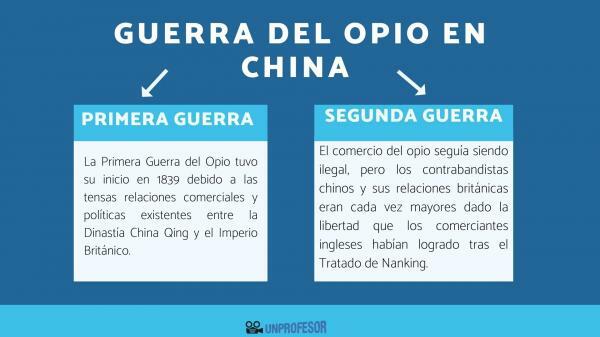OPIUM War: First and Second

On many occasions, throughout history, great conflicts have been caused by the existence of a commercial product, being the possession or management of this element what causes a huge war. An example of this was opium in the mid-19th century that sparked two major conflicts vital to Chinese history and, therefore, in this lecture by a Professor we offer a summary of the Opium War.
The First Opium War had its beginning in 1839 due to the tense commercial and political relations between the Chinese Qing Dynasty and the British Empire.
Causes of the Opium War
In the 18th century, China had enjoyed a great commercial power over Europe, selling items only present on Chinese soil such as tea, silk and porcelain that had served him to get a lot of money and become a great economic empire. In this situation, and the English thinking that Asia was a good market, the creation of the East India Company, being a company that traded from India with the whole world, and initiating a large sale of opium to Chinese smugglers.
Opium had been a highly valued commodity in China, used as medicine and serving to improve the lives of the sick, but the step to be used as a leisure product made many Chinese citizens become addicted. It was in this situation that Chinese Emperor Jiaqing created decrees to prevent opium use, causing the appearance of smugglers who sold this product illegally and getting it, on many occasions, from British India.
Developing
In 1834 trade between China and the East India Company ceased. because the Emperor of China considered that illegal trade was too deep a problem and that he needed to completely end the relationship between the two countries. It was at this time that China's top officials sent a letter to Queen Victoria of the United Kingdom asking the end of opium smuggling, at the same time that all opium was seized from both Chinese companies and foreign.
In this situation, the British chief of commerce in China asked the queen for the use of military force against the Chinese for the attack on British business enterprises. UK sent an armada to bombard Chinese ports as a warning for having blocked trade in the region, causing numerous defeats to the Chinese Empire.
End of the First Opium War
In 1842 China was forced to sign the Treaty of Nanking, which forced him to cede five ports to the English, gave Hong Kong to the British Empire and forced China to give large compensation for having destroyed huge amounts of opium.
To continue with this summary of the Opium War, we must talk about the second of the two wars that took place for this product and that faced China and the Western powers.
Causes of the Second Opium War
In 1852 China had suffered the so-called taiping rebellion, being a kind of civil war between supporters of the Qing Dynasty and the so-called Taiping Heavenly Kingdom. This religious confrontation has its origins in the weakness shown by the Chinese government during their confrontation against the British, being a great conflict that greatly weakened the management of the Qing.
Although the concerns about Taiping's appearance were enormous, they were not as important as those caused by the existence of a illegal opium trade that grew every year. The opium trade was still illegal, but the Chinese smugglers and their British relations were growing given the freedom that English traders had achieved after the Treaty of Nanking.
Development of the war
The beginning of this second war has its origin in the English ship Arrow, who was detained by the Chinese authorities on suspicion that she could be a pirate ship. The negotiation between Chinese and English for the Arrow did not go all that well, since the Chinese government refused to liberalize all the ship's crew, causing the British fleet to bombard some ports Chinese.
On the other hand, the death of a French missionary because of the Chinese government made France to join the UK in their conflict against China. These two great powers were also joined USA, although only as support for the French and British in case their power was not enough.
End of the Second Opium War
The victories of the British and the French were continuous and very numerous and forced China to sign very unequal treaties and where they gave many privileges to Westerners, especially after the occupation of the Forbidden City in Beijing. In the Treaty of Tientsin and the Beijing Convention Several agreements were reached among which were the payment of China to the Westerners for war expenses, the opening of more ports to the United Kingdom and France, the legalization of opium, permission to English and French merchants and missionaries to pass through China, and the transfer of island regions to the United Kingdom and Manchuria to Russia.



